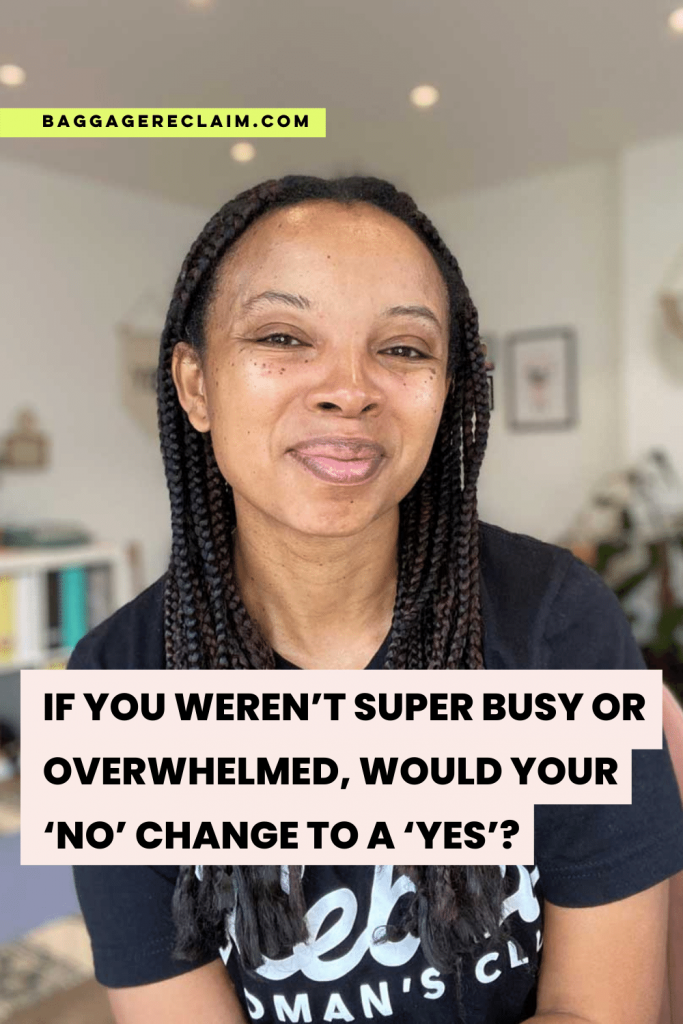One of my favourite ways of saying no as a means of respecting myself and honouring my values is “I don’t have the bandwidth.” In that moment, I acknowledge my existing commitments and needs. I only have so much time, energy and effort. These have an impact on my emotions, in turn impacting my overall emotional, mental, physical and spiritual wellbeing. Saying no from a place of my bandwidth is ultimately recognising the potential impact of saying yes–the meaning and consequences of doing so.
But something crucial to consider as we say no in these circumstances is whether we would want to if we otherwise had the bandwidth. This creates greater awareness of what we do and don’t want to do, making it easier to honour our values and boundaries.
Here’s the thing: Humans have a complicated relationship with rest, listening to ourselves, and creating healthy boundaries.
We behave as if we owe our ‘free time’ to anyone who makes a bid for it. As a result, we feel guilty and ashamed that we need rest, and we behave like machines.
And thanks to The Age of Obedience where parenting, communicating and interacting with children centred on strictness, discipline and compliance, we’re disassociated from our feelings and prone to obliging, gaslighting and emotionally blackmailing us into doing as others expect or claim to need and want. This is especially so when we feel or perceive the other person to be an ‘authority’. We miss vital messages from our bodies about our needs or what isn’t working, struggling to literally sense our boundaries.
We need to be mindful of where we use being ‘busy’ to avoid having to deal with ourselves or others.
For instance, overworking because it gives us an out from having to deal with our family or being connected to our inner world creates far more problems than it solves. Burnout or some form of illness will likely stop us in our tracks and force us to slow down.
If, for instance, we would do something if we had the bandwidth, we need to be aware of our ‘why’. Is it based on desire or obligation?
If, bandwidth permitting, we’d want to do something, then we’ve just received some useful intel. Maybe it’s something we want to make space for in future. We might consider whether what’s currently consuming our bandwidth is a priority so we can, if necessary, make adjustments.
But if the only reason we’d say yes is a sense of obligation, then we need to recognise our no. We’re not for everyone else’s consumption, and we don’t owe people our bandwidth.
We’re also allowed to say no simply because we want to. Yes, we are! We don’t have to wait until we’re exhausted or our schedule’s maxed out to say no.
Sure, it’s not always going to be possible to only do the things we want. But if our litmus test for doing stuff is basically crappy feelings of obligation and shame, we’re always going to have a problem with our yes and no. We’ll say yes for disingenuous and unboundaried reasons, and that will always create big problems.
Recognition of whether we’d want to do something if we had the bandwidth is crucial. How we say no communicates to us as well as others what we’re open to. If we imply that we’d do something if only we had the bandwidth, this implies that bandwidth permitting, we’ll say yes in future. All well and good if that’s true, but it’s a problem when we’re never going to want to do it.
Sure, we can still say we don’t have the bandwidth, but we can also be clear. e.g. “I don’t have the bandwidth to take on unpaid work”. “I’m not around on evenings for the foreseeable future.” Even if we don’t express any detail, us knowing our no means we can actively take care of ourselves—and that’s always a good thing.
Are you ready to stop silencing and hiding yourself in an attempt to ‘please’ or protect yourself from others? My book, The Joy of Saying No: A Simple Plan to Stop People Pleasing, Reclaim Boundaries, and Say Yes to the Life You Want (Harper Horizon), is out now.

Pin For Later


 Add to favorites
Add to favorites 